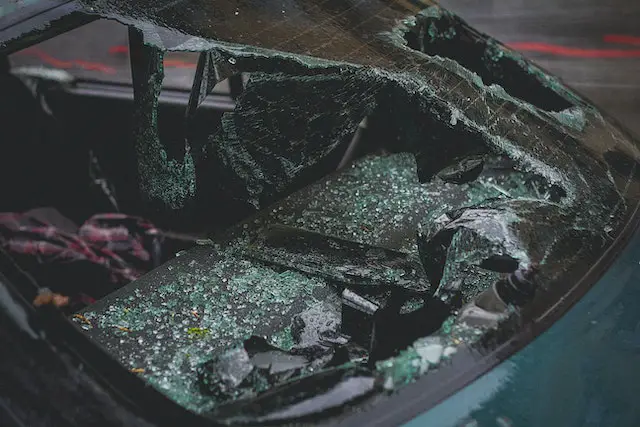
How Long After an Accident Can a Citation Be Issued?
The contents of this web page are for informational and educational purposes only, and nothing you read is intended to be legal advice. Please review our disclaimer before taking action based upon anything you read or see.
How long after an accident can a citation be issued? Many accident victims usually ask this question today. Thus, we have made this post to aid you. A citation for a traffic violation resulting from an accident can be issued immediately at the scene or within a few days. However, the specific time frame can vary depending on the state and circumstances of the accident. It’s essential to contact a local attorney or the DMV to learn more about the regulations in your area.
A traffic citation, a traffic ticket, is an official record police officers provide to motorists who break the law. It often contains details like the offense’s time and place, the exact statute present, and any fines or penalties possible.
The citation may be issued soon after a crash or after a few days have passed. A ticket may not be issued in small crashes when the drivers responsible additionally share contact numbers.
However, law enforcement personnel may still evaluate the circumstance and issue a citation immediately or later. Furthermore, some variables often affect when the citation is available. Come along as we highlight this below.
Factors that Affect the Timing of Issuing Traffic Citations after an Accident

The severity of the Accident
The timeliness of issuing traffic tickets may vary depending on the collision’s seriousness. Officers may decide to issue tickets right away after a minor collision.
Officers may need to prioritize securing the area, providing medical care, and directing traffic in more serious incidents, which might delay serving tickets. Citations may be issued later when the accident necessitates extensive efforts to investigate and record.
Witness accounts provide important details regarding what transpired during an accident. Police officers may utilize them to determine who was responsible, what caused the collision, and if traffic regulations were broken. With witness accounts, deciding the best course of action might be easier, particularly whether to give out traffic fines.
The necessity for witness testimony also contributes to delays in issuing traffic tickets. The investigative procedure might be considerably slow if a witness is unreachable or refuses to provide a statement.
Police officer workload
In addition to keeping our roadways safe, police officers have a variety of additional duties, such as reacting to emergencies and conducting investigations. In light of this, officers may have to favor specific assignments above others since they only have a limited amount of time.
Sadly, given their workload, law enforcement personnel may not make issuing traffic citations after a crash a high priority. The issue of citations may sometimes encounter delays if police are required to leave the accident site to attend to a more urgent emergency.
Jurisdictional policies
Regarding traffic citations, many jurisdictions have distinct rules. Some may demand that police issue citations almost after following a crash, while others may give investigators more time.
The timeliness of the issue of traffic tickets may also get influenced by state and municipal rules. For instance, a few jurisdictions have statutes of restrictions that mandate authorities to issue tickets following an accident within a certain amount of time.
Technology and documentation
There are several benefits to using technology to issue citations, including quicker turnaround times, more accuracy, and less paperwork. Technology can present certain difficulties, however, such as the expense of adoption and the need for officers to get training on the latest technologies. There can also be worries regarding critical information safety and confidentiality.
In issuing traffic citations after an accident, precise paperwork is also essential. The location of the event, the cars involved, the date and time of the crash, and other details must all be noted by police officers.
Driver cooperation
To properly issue traffic citations, drivers must cooperate. Officers might have to devote more time collecting evidence, which may cause delays in issuing penalties if drivers decline to divulge their identity or insurance information or comply with the inquiry.
Drivers who decline to assist police officials may get instant traffic tickets and penalties or be arrested. Any legal actions involving the accident may suffer from non-cooperation as well.
Legal considerations
The wording used in traffic citations must be precise and state the claimed infringement, the date and hour of the offense, and the punishment or other penalty. The citation could get dismissal if these conditions are not present.
Additionally, receiving a traffic ticket may greatly impact your insurance and responsibility. Citation-holders may also experience higher insurance costs or possibly coverage refusal. Citations may also influence the result of any connected legal actions.
Administrative procedures
Administrative procedures are the guidelines and processes that law enforcement authorities must adhere to while issuing traffic tickets. These include the citation filing and serving procedures and the submission of citation data to the court.
The time traffic tickets are issued may also be impacted by complicated administrative processes. Public safety may need to be corrected if citations are dismissed due to lateness in filling them out or filling them.
Common Reasons for Delayed Issuance of Traffic Citations after an Accident

Some common reasons for delayed issuance of traffic citations after an accident include:
Speeding and reckless driving as causes for tickets
Speeding continues to be a major factor in road accidents. Per the National Highway Safety Administration, speeding contributed to 26% of all highway deaths in 2021. Furthermore, issuing speeding penalties may be a significant cash generator for municipal governments. After an accident, careless driving is another frequent reason for receiving a traffic ticket. Driving recklessly may have serious repercussions, such as fines, suspension of license or annulment, and even prison time.
However, issuing a careless driving ticket may be longer, owing to the need for a comprehensive investigation, much like speeding fines. Officers may need to speak with witnesses, watch surveillance videos, or contact accident reconstruction specialists.
Failure to yield or stop at a traffic signal
One of the frequent driving infractions that might cause an accident is failing to yield or stop at a stop sign. Common situations include not coming to a complete stop at a red light or stop sign and failing to stop for pedestrians or other cars.
Failure to stop or yield may result in a traffic ticket, penalties, points on your record, and ultimately the suspension or revocation of your license. Failure to stop or yield in extreme circumstances might result in a crash with injuries, property destruction, or even fatalities.
Driving under the influence of drugs or alcohol
They are driving while intoxicated (DUI) is a serious traffic offense that may result in an accident. DUI laws and rules are available to safeguard motorists, passengers, and walkers from collisions by DUI drivers. According to these regulations, it is illegal for drivers to operate a vehicle if their blood alcohol content (BAC) is 0.08% or higher.
Driving while intoxicated may have serious, long-lasting effects. This involves getting a DUI ticket, paying penalties, having your license under suspension, and even going to prison.
DUI offenses are among the most serious driving infractions. This is valid since they may lead to accidents that cause injuries, property damage, or even fatalities.
Distracted driving and the use of electronic devices
Distracted driving can lead to traffic violations, including running red lights, reckless driving, and failure to yield. Furthermore, distracted driving incidents result in deaths, injuries, and wreckage. According to the NHTSA, distracted driving contributed to 15% of injury incidents and 8% of death collisions in 2021.
Many states have passed legislation outlawing gadgets while driving, and some even forbidding the usage of portable devices. However, it might be difficult for law enforcement officials to implement these laws.
Traffic violations related to vehicle maintenance and registration
Breaking a taillight or having an expired registration are examples of car maintenance offenses.
An officer may issue a ticket immediately if they observe a vehicle maintenance infraction at the site of an accident. The officer may also need to check with the DMV to ensure the registration was truly invalid at the moment of the accident if the ticket is for an invalid license. And it can take some time.
Possible consequences of receiving a ticket after a traffic accident
Getting a ticket for a moving infraction may have a variety of repercussions. First, there could be a financial strain from paying the fee. This might run into the hundreds of dollars. Additionally, if a motorist accumulates enough demerit points on their record, it might lead to higher auto insurance rates.
This is in addition to a potential license suspension. Persistent traffic infractions may also result in criminal prosecution, which might result in jail time or probation. Obeying traffic laws is crucial to avoid the various negative consequences of receiving a ticket.
My Opinion
The duration for a citation to be available after an accident depends on several factors. And this highlight is above. Furthermore, citations may be present immediately in more serious accidents or incidents resulting in deaths. This will make identifying the responsible party easier and maybe even filing appropriate charges.
References
- Traffic & Ticket Basics: https://selfhelp.courts.ca.gov/traffic
- California Vehicle Code, Sec. 40902, Evidence: https://leginfo.legislature.ca.gov/faces/codes_displaySection.xhtml?lawCode=VEH§ionNum=40902.
- Infractions (Tickets). Bellingham Municipal Court: https://web.archive.org/web/20130116102429/http://www.cob.org/government/court/infractions.aspx#mitigating

I’m a driven and accomplished law graduate and post-graduate, passionate about sharing my legal expertise via my blog. I hold a Bachelor’s degree in Law from the University of London (UK) and a Master’s in Law from the University of Derby (UK). Both gave me the foundational knowledge and skills to excel in my chosen career path.
Throughout my academic journey, I have gained extensive knowledge in various fields of Law, including Corporate and Business Law in the USA, Criminal Law, International Law, US Copyright law, and most importantly, American Constitutional law.


Comments are closed.